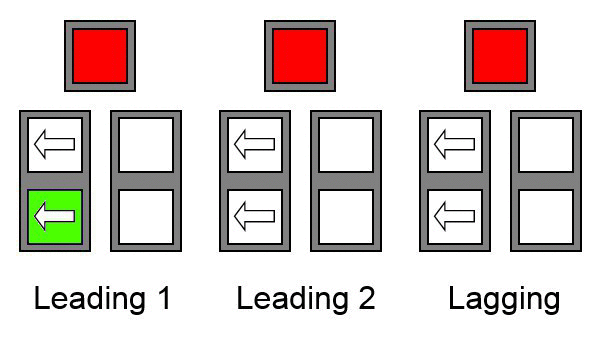Difference between revisions of "Glossary"
From HighwayWiki
m (→Doghouse Signal) |
m (→Doghouse Signal) |
||
| Line 24: | Line 24: | ||
===Doghouse Signal=== | ===Doghouse Signal=== | ||
:: When MUTCD started requiring green arrows to be terminated with yellow arrows, many jurisdictions didn't have the clearance required for 5 signal sections to be hung in a stack over traffic. To overcome this issue, the doghouse configuration came to be. This consists of a red section placed center above 2 stacks, one of through traffic's yellow and green, and the other stack being the green and yellow arrows. This creates a doghouse shape if one were to loosely trace the configuration. Some newer doghouses consist of standard 3-section signals with 2-section arrow signals on the sides, and although this doesn't create the same doghouse shape, it's still classified as the same. | :: When MUTCD started requiring green arrows to be terminated with yellow arrows, many jurisdictions didn't have the clearance required for 5 signal sections to be hung in a stack over traffic. To overcome this issue, the doghouse configuration came to be. This consists of a red section placed center above 2 stacks, one of through traffic's yellow and green, and the other stack being the green and yellow arrows. This creates a doghouse shape if one were to loosely trace the configuration. Some newer doghouses consist of standard 3-section signals with 2-section arrow signals on the sides, and although this doesn't create the same doghouse shape, it's still classified as the same. | ||
| − | |||
:: '''''"Doghouse"''''' | :: '''''"Doghouse"''''' | ||
:: All sections are 12" | :: All sections are 12" | ||
Revision as of 03:44, 13 December 2013
This page is meant to define and clarify the meanings of traffic control terms and lingo. Expand.......
Contents
Words and Meanings=
Signal Phasing Terms
Leading / Lagging Arrow
- When a dedicated turn arrow is offered at a signal-controlled intersection, its operation will often be defined as either 'Leading' or 'Lagging'. Leading arrows happen at the beginning of the through green cycle, and generally end with a yellow arrow before the through green is finished. Lagging arrows often happen towards the end of the through green cycle, and usually have their yellow arrows tied with the through yellow, or simply rely on the through yellow entirely.
Example
- Example text
- Example example
Terms of Physical Signal Features
Doghouse Signal
- When MUTCD started requiring green arrows to be terminated with yellow arrows, many jurisdictions didn't have the clearance required for 5 signal sections to be hung in a stack over traffic. To overcome this issue, the doghouse configuration came to be. This consists of a red section placed center above 2 stacks, one of through traffic's yellow and green, and the other stack being the green and yellow arrows. This creates a doghouse shape if one were to loosely trace the configuration. Some newer doghouses consist of standard 3-section signals with 2-section arrow signals on the sides, and although this doesn't create the same doghouse shape, it's still classified as the same.
- "Doghouse"
- All sections are 12"
- "Cheap Doghouse"
- The R, Y, & G sections are 8"; the Arrows are 12"
- "Pinhead Doghouse"
- The Red is 8"; all other sections are 12"
WAIT-WALK Pedestrian Signal
- [Insert info here]
Franken-Signal
- When a traffic signal (whether in public or not) is composed of sections or parts from multiple manufacturers or models from the same manufacturer that aren't designed to normally go together, this signal is unofficially called a Franken-Signal, in reference to Frankenstein's Monster. Due to newer signal models being composed of individual indication sections, contractors sometimes do this in the field to help use up old sections laying around and to save money. The term Franken-Signal generally only applies to the housings; lenses are often more difficult to spot as incorrect from ground level and often don't make enough of a difference to be discernible.
